(新课标) Unit 2 Section B 1a-1e 课件 (新目标英语七下 Unit 2 What time do you go to school?)
文档属性
| 名称 | (新课标) Unit 2 Section B 1a-1e 课件 (新目标英语七下 Unit 2 What time do you go to school?) |

|
|
| 格式 | pptx | ||
| 文件大小 | 11.3MB | ||
| 资源类型 | 试卷 | ||
| 版本资源 | 人教新目标(Go for it)版 | ||
| 科目 | 英语 | ||
| 更新时间 | 2024-06-09 21:03:53 | ||
图片预览


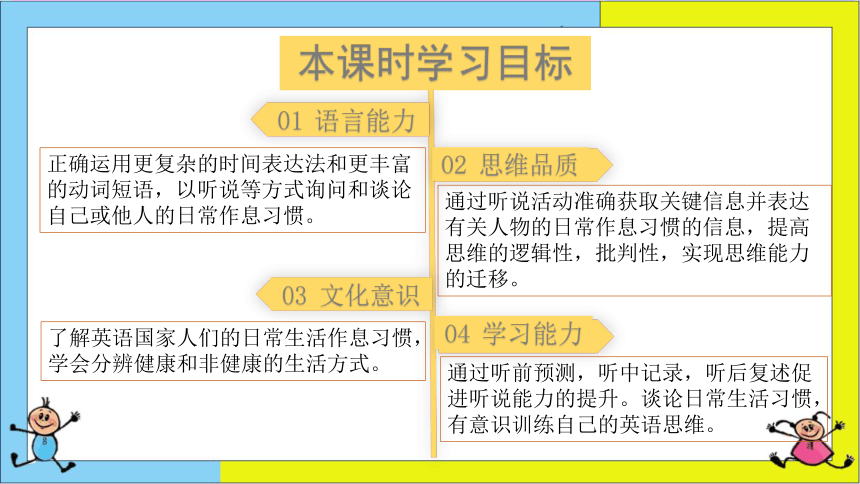
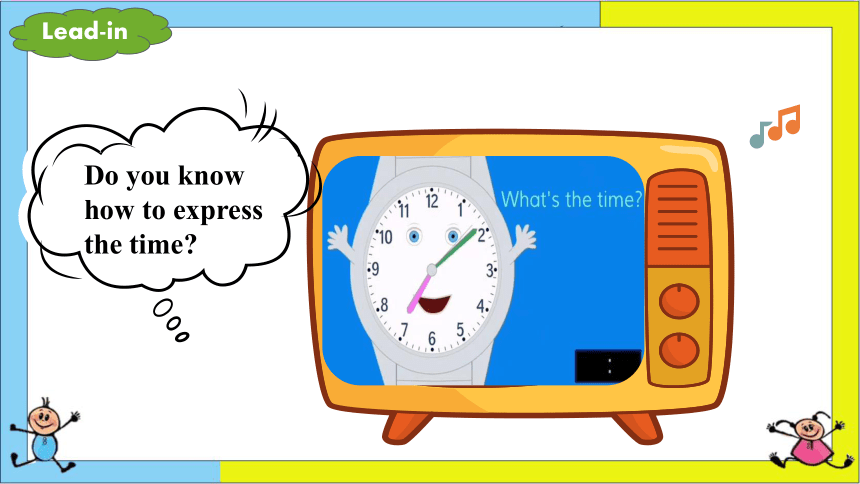
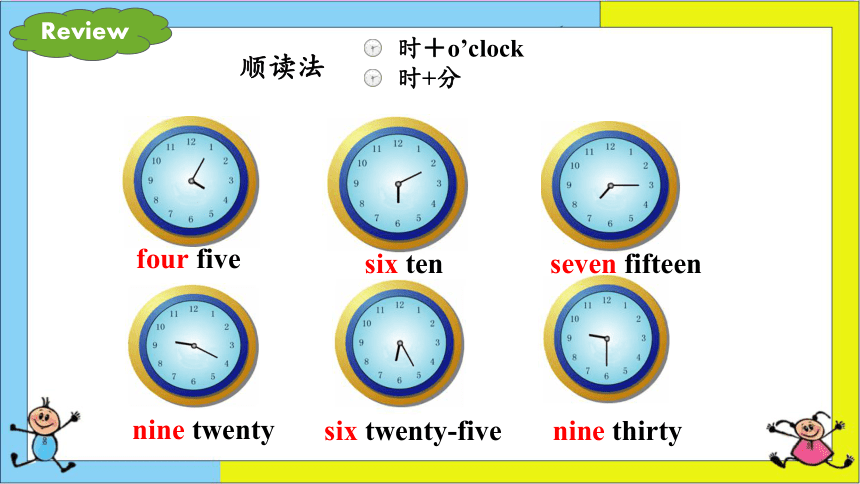
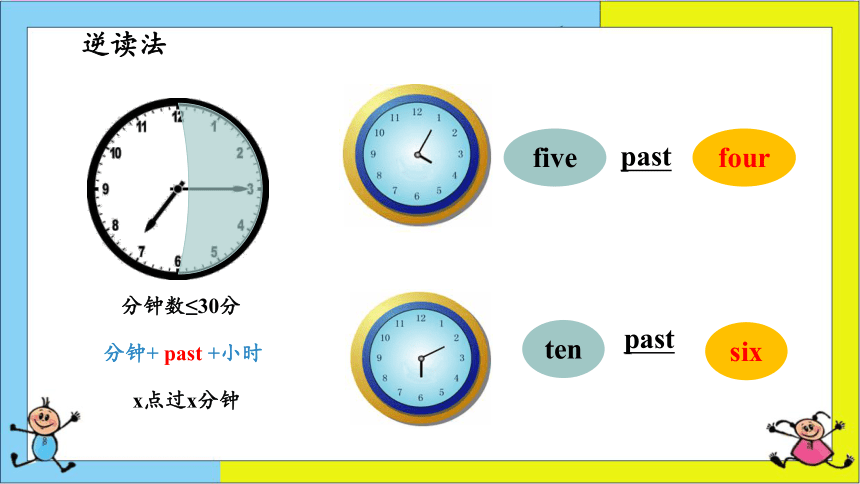
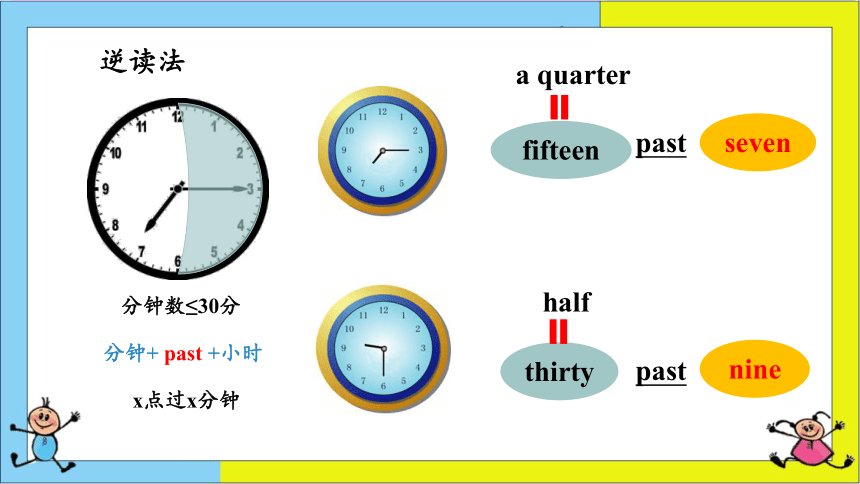
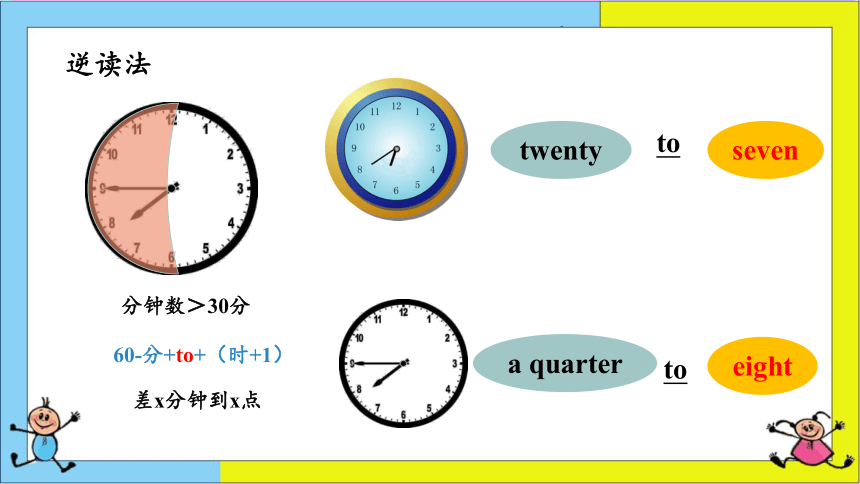

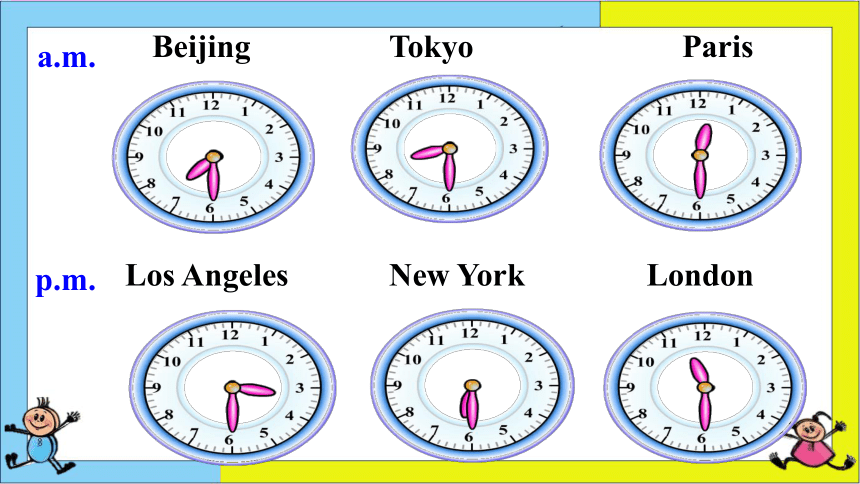
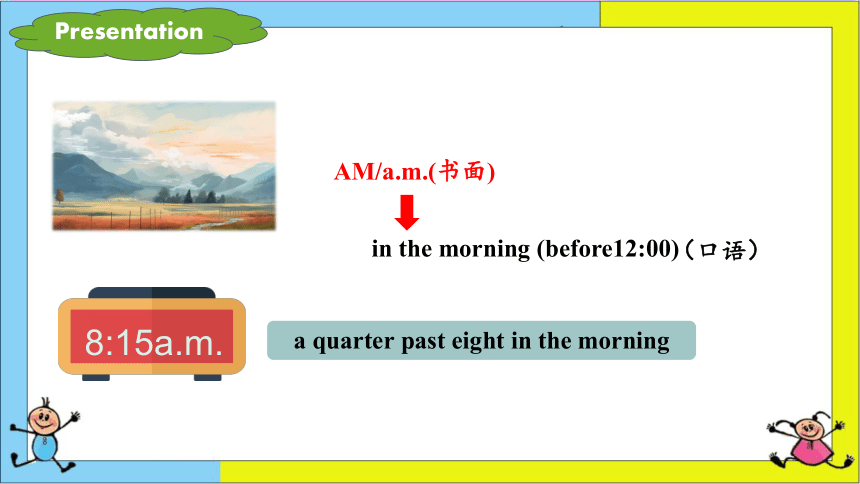
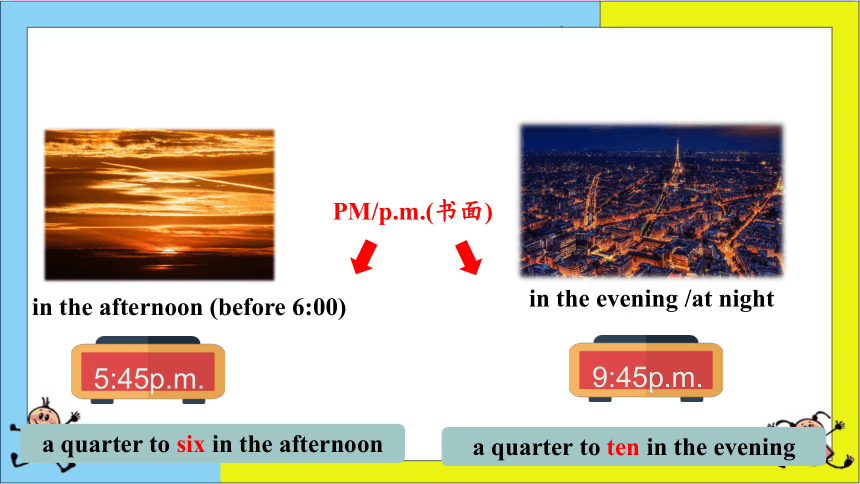
文档简介
(共42张PPT)
Section B
1a-1e
本课时学习目标
01 语言能力
02 思维品质
03 文化意识
04 学习能力
正确运用更复杂的时间表达法和更丰富的动词短语,以听说等方式询问和谈论自己或他人的日常作息习惯。
了解英语国家人们的日常生活作息习惯,学会分辨健康和非健康的生活方式。
通过听说活动准确获取关键信息并表达有关人物的日常作息习惯的信息,提高思维的逻辑性,批判性,实现思维能力的迁移。
通过听前预测,听中记录,听后复述促进听说能力的提升。谈论日常生活习惯,有意识训练自己的英语思维。
Lead-in
Do you know how to express the time
Review
顺读法
时+o’clock
时+分
nine thirty
six twenty-five
four five
seven fifteen
nine twenty
six ten
逆读法
分钟+ past +小时
分钟数≤30分
x点过x分钟
five
past
four
ten
six
past
逆读法
分钟+ past +小时
分钟数≤30分
x点过x分钟
a quarter
thirty
nine
past
fifteen
seven
past
half
60-分+to+(时+1)
分钟数>30分
差x分钟到x点
a quarter
eight
to
twenty
seven
to
逆读法
分钟数是30时,可以用half表示。如:6:30—half past six。
分钟数是15时,用 “a quarter past+钟点数”表示。如:6:15—a quarter past six。
分钟数是45时,用 “a quarter to+(钟点数+1)”表示。如:6:45—a quarter to seven。
(60-分钟数)+to+(钟点数+1)表示“差……分到……点”,如:6:50—ten to seven。
分钟数+past+钟点数表示“……点过……分”,如:6:12—twelve past six。
分钟数>30
分钟数<30
Summary
Beijing
London
Tokyo
Paris
Los Angeles
New York
p.m.
a.m.
AM/a.m.(书面)
in the morning (before12:00)
8:15a.m.
a quarter past eight in the morning
(口语)
Presentation
PM/p.m.(书面)
in the afternoon (before 6:00)
5:45p.m.
a quarter to six in the afternoon
in the evening /at night
9:45p.m.
a quarter to ten in the evening
Read the clock time as quickly as possible.
a quarter to ten in the evening
half past six in the morning
a quarter past three in the afternoon
a quarter to seven in the evening
Practice
1a
a quarter to
ten in the evening___
1
2
4
1.do homework
2.eat dinner
3.eat breakfast
4.go to bed
half past six in the morning ___
/ h mw (r)k/ n. 家庭作业(不可数)
a quarter to
seven in the
evening___
a quarter past
three in the
afternoon___
When do students usually do these things Match
the activities with the time of day.
3
1b
Check your answers with your partner.
When do students usually do these things
A: When do students in our school…
B: We …
do exercise
A: When do students in our school…
B: We …
do homework
A: When do students in our school…
B: We …
get up
A: When do students in our school…
B: We …
go to bed
Read and learn the the expressions in the chart.
1. get up 6. do my homework
2. run 7. clean my room
3. eat breakfast 8. eat dinner
4. go to school 9. take a walk
5. go home 10. go to bed
v. 跑;奔
do (one’s) homework 做作业
v. 打扫;
弄干净
adv. 干净的
散步;走一走
Can you add more expressions
起居 饮食就餐 学习 家务 运动休闲
get up go to bed take a shower go to school go home eat breakfast eat lunch eat dinner do homework clean my room run
take a walk
study for the test
read a book
make the bed
do the dishes
wash clothes
jump
exercise
go fishing
1. get up _____ 6. do my homework _____
2. run _____ 7. clean my room _____
3. eat breakfast ____ 8. eat dinner _____
4. go to school _____ 9. take a walk _____
5. go home _____ 10. go to bed _____
Listen and circle the activities you hear.
1c
Listen again. Write the times next to the activities you circled in 1c.
1. get up ________ 6. do my homework ________
2. run ________ 7. clean my room _________
3. eat breakfast ________8. eat dinner _________
4. go to school _________ 9. take a walk _________
5. go home _________ 10. go to bed _________
6:00 a. m.
7:00 a. m.
7:45 a. m.
4:15 p. m.
5:30 p. m.
7:15 p. m.
9:00 p. m.
5:30
1d
Listen again and answer the questions.
1. Who is talking about his day
2. Does Tom get up early When does he get up
3. When does he exercise, in the morning or in the evening
4. How long does he run in the morning
Tom.
Yes, he does. Tom gets up at half past five.
He exercises in the morning.
For an hour.
1d
Interviewer: Tom, I want to know about your day.
Tom: OK.
Interviewer: When do you get up
Tom: When do I get up Hmm. Usually about half past five. Then I run at six o’clock.
Interviewer: You run at six in the morning
Tom: Uh-huh.
Interviewer: And what time do you eat breakfast
Tom: Breakfast Usually about seven. And then I usually go to school at a quarter to eight.
Interviewer: Wow! And you go home at…
Tom: A quarter past four in the afternoon.
Interviewer: And what do you do in the evening
Tom: I do my homework at about five thirty, and I eat dinner at seven fifteen. I go to bed at nine o’clock.
Interviewer: That’s early! But then you get up early.
Tom: Uh-huh.
Ask and answer questions about Tom.
B: He usually gets up at half past five.
Tom’s day Time
get up
run
eat breakfast
go to school
go home
do homework
eat dinner
go to bed
6:00am
7:00am
8:45am
4:15pm
5:30pm
7:15pm
5:30am
9:00pm
A: When does Tom usually get up
B: He usually …at…
A: When does Tom usually…
1e
Give a report about Tom’s day.
Tom’s day Time
get up
run
eat breakfast
go to school
go home
do homework
eat dinner
go to bed
This is Tom’s daily routine.
First, he usually gets up at half past five in the morning.
Then, he often runs at six a.m. …
Next, …
After that…
In the afternoon…
At last…
6:00am
7:00am
8:45am
4:15pm
5:30pm
7:15pm
5:30am
9:00pm
1e
Is Tom’s life healthy Why or why not
What do you learn from Tom’s day
He gets up and goes to bed .
He in the morning.
He plays computer games.
early
early
exercise
never
Point 1
half past six in the morning
half /hɑ f/,/h f/ n. & pron. 一半;半数
half 可作名词或代词,其复数形式为halves。 half of…意为“一半……”;in half = into halves,意为“分为两半”。
He cut the orange in half (=into halves). 他将橙子切;成两半。
I know half of them. 我认识他们中一半的人。
Half of the apples are sour. 一半的苹果是酸的。
与apples的数保持一致
Language points
Point 2
half past six in the morning
past /pɑ st/, /p st/ prep. 晚于;过(时间) adj. 过去的
(1) past在此作介词,意为“晚于;过(时间)”,用来表示时间,用于分钟数不超过30分钟的情况。“ half past + 整点时间”表示“几点半”。
Lily gets up at ten past six. 莉莉六点十分起床。
(2) past也可作形容词,意为“过去的”。
in past years 在过去的岁月
Point 3
a quarter past three in the afternoon
quarter / kw (r)t (r) / n. 一刻钟;四分之一
He arrived after a quarter.
他一刻钟以后到达了。
Three quarters of our classmates are good at basketball.
我们班有四分之三的学生擅长篮球运动。
一刻钟
四分之一
Point 4
run
run作动词, 意为“跑;奔”,其现在分词形式为running。runner作名词,意为“跑步者”。
【语境串记】
The boy is good at running. He runs with other runners in the park every morning. 这个男孩擅长跑步,每天早上他都与其他跑步者在公园里跑步。
【拓展】run作动词,还有“经营、管理”的含义。
run /r n/ v. 跑;奔
Point 5
clean my room
clean /kli n/ v. 打扫;弄干净 adj. 干净的
(1) clean 在此处作及物动词,其后可直接跟宾语。clean up 意为“打扫干净;清理”。
Sam, you must clean your bedroom.
萨姆,你必须打扫你的卧室。
(2) clean 还可作形容词,意为“干净的”
其反义词为dirty (脏的)。
Her room is beautiful and clean.
她的房间既漂亮又干净。
v. 打扫
adj.干净的
Point 5
take a walk
take a walk 的同义短语为have a walk或go for a walk。
My grandfather often takes a walk after dinner.
晚饭后,我爷爷经常去散步。
【拓展】walk还可作不及物动词,意为“行走;步行”。
The baby is learning to walk. 这个宝宝正在学走路。
She walks to school every day. 她每天步行上学。
1.Jim often does ______ homework after supper.
A. his B. my C. one’s
2. —It’s 9:50, right
— Yes, it’s _______.
A. ten past ten B. ten to nine C. ten to ten
3.—What do you usually do after supper
—I often _______.
A. takes a walk B. has a walk C. take a walk
一. 单选
Exercises
二、用to和past表达下列时间
a quarter past three in the afternoon
1
3:15 PM
2
7:30 AM
3
9:45 AM
4
9:55 PM
5
12:05 PM
half past seven in the morning
a quarter to ten in the morning
five to ten in the evening
five past twelve in the afternoon
1. ________(一半) the class eat lunch at school.
2. My cousin often ________(跑) to school.
3. Can you finish your ___________(家庭作业) in an hour
4. The girl’s room is ________(干净的) and tidy.
clean
Half
runs
homework
三、根据句意及所给汉语提示,写出句中所缺单词。
Summary
half past
o’clock
a quarter
a quarter
o’clock
30
0
15
45
0
分钟+ past +小时
分钟数≤30分
x点过x分钟
60-分+to+(时+1)
分钟数>30分
差x分钟到x点
do (one’s) homework, take a walk
When do students usually eat dinner
They usually eat dinner at a quarter to seven in the evening.
Useful expressions
Sentences
Key words
half, past, quarter, homework, run, clean, walk
Homework
1. Finish the exercises.
2. Make a survey
Work in groups of 4. Ask and answer what they usually do in the afternoon and in the evening. Then give your report.
Early to bed early to rise, makes you healthy, wealthy and wise.
Section B
1a-1e
本课时学习目标
01 语言能力
02 思维品质
03 文化意识
04 学习能力
正确运用更复杂的时间表达法和更丰富的动词短语,以听说等方式询问和谈论自己或他人的日常作息习惯。
了解英语国家人们的日常生活作息习惯,学会分辨健康和非健康的生活方式。
通过听说活动准确获取关键信息并表达有关人物的日常作息习惯的信息,提高思维的逻辑性,批判性,实现思维能力的迁移。
通过听前预测,听中记录,听后复述促进听说能力的提升。谈论日常生活习惯,有意识训练自己的英语思维。
Lead-in
Do you know how to express the time
Review
顺读法
时+o’clock
时+分
nine thirty
six twenty-five
four five
seven fifteen
nine twenty
six ten
逆读法
分钟+ past +小时
分钟数≤30分
x点过x分钟
five
past
four
ten
six
past
逆读法
分钟+ past +小时
分钟数≤30分
x点过x分钟
a quarter
thirty
nine
past
fifteen
seven
past
half
60-分+to+(时+1)
分钟数>30分
差x分钟到x点
a quarter
eight
to
twenty
seven
to
逆读法
分钟数是30时,可以用half表示。如:6:30—half past six。
分钟数是15时,用 “a quarter past+钟点数”表示。如:6:15—a quarter past six。
分钟数是45时,用 “a quarter to+(钟点数+1)”表示。如:6:45—a quarter to seven。
(60-分钟数)+to+(钟点数+1)表示“差……分到……点”,如:6:50—ten to seven。
分钟数+past+钟点数表示“……点过……分”,如:6:12—twelve past six。
分钟数>30
分钟数<30
Summary
Beijing
London
Tokyo
Paris
Los Angeles
New York
p.m.
a.m.
AM/a.m.(书面)
in the morning (before12:00)
8:15a.m.
a quarter past eight in the morning
(口语)
Presentation
PM/p.m.(书面)
in the afternoon (before 6:00)
5:45p.m.
a quarter to six in the afternoon
in the evening /at night
9:45p.m.
a quarter to ten in the evening
Read the clock time as quickly as possible.
a quarter to ten in the evening
half past six in the morning
a quarter past three in the afternoon
a quarter to seven in the evening
Practice
1a
a quarter to
ten in the evening___
1
2
4
1.do homework
2.eat dinner
3.eat breakfast
4.go to bed
half past six in the morning ___
/ h mw (r)k/ n. 家庭作业(不可数)
a quarter to
seven in the
evening___
a quarter past
three in the
afternoon___
When do students usually do these things Match
the activities with the time of day.
3
1b
Check your answers with your partner.
When do students usually do these things
A: When do students in our school…
B: We …
do exercise
A: When do students in our school…
B: We …
do homework
A: When do students in our school…
B: We …
get up
A: When do students in our school…
B: We …
go to bed
Read and learn the the expressions in the chart.
1. get up 6. do my homework
2. run 7. clean my room
3. eat breakfast 8. eat dinner
4. go to school 9. take a walk
5. go home 10. go to bed
v. 跑;奔
do (one’s) homework 做作业
v. 打扫;
弄干净
adv. 干净的
散步;走一走
Can you add more expressions
起居 饮食就餐 学习 家务 运动休闲
get up go to bed take a shower go to school go home eat breakfast eat lunch eat dinner do homework clean my room run
take a walk
study for the test
read a book
make the bed
do the dishes
wash clothes
jump
exercise
go fishing
1. get up _____ 6. do my homework _____
2. run _____ 7. clean my room _____
3. eat breakfast ____ 8. eat dinner _____
4. go to school _____ 9. take a walk _____
5. go home _____ 10. go to bed _____
Listen and circle the activities you hear.
1c
Listen again. Write the times next to the activities you circled in 1c.
1. get up ________ 6. do my homework ________
2. run ________ 7. clean my room _________
3. eat breakfast ________8. eat dinner _________
4. go to school _________ 9. take a walk _________
5. go home _________ 10. go to bed _________
6:00 a. m.
7:00 a. m.
7:45 a. m.
4:15 p. m.
5:30 p. m.
7:15 p. m.
9:00 p. m.
5:30
1d
Listen again and answer the questions.
1. Who is talking about his day
2. Does Tom get up early When does he get up
3. When does he exercise, in the morning or in the evening
4. How long does he run in the morning
Tom.
Yes, he does. Tom gets up at half past five.
He exercises in the morning.
For an hour.
1d
Interviewer: Tom, I want to know about your day.
Tom: OK.
Interviewer: When do you get up
Tom: When do I get up Hmm. Usually about half past five. Then I run at six o’clock.
Interviewer: You run at six in the morning
Tom: Uh-huh.
Interviewer: And what time do you eat breakfast
Tom: Breakfast Usually about seven. And then I usually go to school at a quarter to eight.
Interviewer: Wow! And you go home at…
Tom: A quarter past four in the afternoon.
Interviewer: And what do you do in the evening
Tom: I do my homework at about five thirty, and I eat dinner at seven fifteen. I go to bed at nine o’clock.
Interviewer: That’s early! But then you get up early.
Tom: Uh-huh.
Ask and answer questions about Tom.
B: He usually gets up at half past five.
Tom’s day Time
get up
run
eat breakfast
go to school
go home
do homework
eat dinner
go to bed
6:00am
7:00am
8:45am
4:15pm
5:30pm
7:15pm
5:30am
9:00pm
A: When does Tom usually get up
B: He usually …at…
A: When does Tom usually…
1e
Give a report about Tom’s day.
Tom’s day Time
get up
run
eat breakfast
go to school
go home
do homework
eat dinner
go to bed
This is Tom’s daily routine.
First, he usually gets up at half past five in the morning.
Then, he often runs at six a.m. …
Next, …
After that…
In the afternoon…
At last…
6:00am
7:00am
8:45am
4:15pm
5:30pm
7:15pm
5:30am
9:00pm
1e
Is Tom’s life healthy Why or why not
What do you learn from Tom’s day
He gets up and goes to bed .
He in the morning.
He plays computer games.
early
early
exercise
never
Point 1
half past six in the morning
half /hɑ f/,/h f/ n. & pron. 一半;半数
half 可作名词或代词,其复数形式为halves。 half of…意为“一半……”;in half = into halves,意为“分为两半”。
He cut the orange in half (=into halves). 他将橙子切;成两半。
I know half of them. 我认识他们中一半的人。
Half of the apples are sour. 一半的苹果是酸的。
与apples的数保持一致
Language points
Point 2
half past six in the morning
past /pɑ st/, /p st/ prep. 晚于;过(时间) adj. 过去的
(1) past在此作介词,意为“晚于;过(时间)”,用来表示时间,用于分钟数不超过30分钟的情况。“ half past + 整点时间”表示“几点半”。
Lily gets up at ten past six. 莉莉六点十分起床。
(2) past也可作形容词,意为“过去的”。
in past years 在过去的岁月
Point 3
a quarter past three in the afternoon
quarter / kw (r)t (r) / n. 一刻钟;四分之一
He arrived after a quarter.
他一刻钟以后到达了。
Three quarters of our classmates are good at basketball.
我们班有四分之三的学生擅长篮球运动。
一刻钟
四分之一
Point 4
run
run作动词, 意为“跑;奔”,其现在分词形式为running。runner作名词,意为“跑步者”。
【语境串记】
The boy is good at running. He runs with other runners in the park every morning. 这个男孩擅长跑步,每天早上他都与其他跑步者在公园里跑步。
【拓展】run作动词,还有“经营、管理”的含义。
run /r n/ v. 跑;奔
Point 5
clean my room
clean /kli n/ v. 打扫;弄干净 adj. 干净的
(1) clean 在此处作及物动词,其后可直接跟宾语。clean up 意为“打扫干净;清理”。
Sam, you must clean your bedroom.
萨姆,你必须打扫你的卧室。
(2) clean 还可作形容词,意为“干净的”
其反义词为dirty (脏的)。
Her room is beautiful and clean.
她的房间既漂亮又干净。
v. 打扫
adj.干净的
Point 5
take a walk
take a walk 的同义短语为have a walk或go for a walk。
My grandfather often takes a walk after dinner.
晚饭后,我爷爷经常去散步。
【拓展】walk还可作不及物动词,意为“行走;步行”。
The baby is learning to walk. 这个宝宝正在学走路。
She walks to school every day. 她每天步行上学。
1.Jim often does ______ homework after supper.
A. his B. my C. one’s
2. —It’s 9:50, right
— Yes, it’s _______.
A. ten past ten B. ten to nine C. ten to ten
3.—What do you usually do after supper
—I often _______.
A. takes a walk B. has a walk C. take a walk
一. 单选
Exercises
二、用to和past表达下列时间
a quarter past three in the afternoon
1
3:15 PM
2
7:30 AM
3
9:45 AM
4
9:55 PM
5
12:05 PM
half past seven in the morning
a quarter to ten in the morning
five to ten in the evening
five past twelve in the afternoon
1. ________(一半) the class eat lunch at school.
2. My cousin often ________(跑) to school.
3. Can you finish your ___________(家庭作业) in an hour
4. The girl’s room is ________(干净的) and tidy.
clean
Half
runs
homework
三、根据句意及所给汉语提示,写出句中所缺单词。
Summary
half past
o’clock
a quarter
a quarter
o’clock
30
0
15
45
0
分钟+ past +小时
分钟数≤30分
x点过x分钟
60-分+to+(时+1)
分钟数>30分
差x分钟到x点
do (one’s) homework, take a walk
When do students usually eat dinner
They usually eat dinner at a quarter to seven in the evening.
Useful expressions
Sentences
Key words
half, past, quarter, homework, run, clean, walk
Homework
1. Finish the exercises.
2. Make a survey
Work in groups of 4. Ask and answer what they usually do in the afternoon and in the evening. Then give your report.
Early to bed early to rise, makes you healthy, wealthy and wise.
同课章节目录
- Unit 1 Can you play the guitar?
- Section A
- Section B
- Unit 2 What time do you go to school?
- Section A
- Section B
- Unit 3 How do you get to school?
- Section A
- Section B
- Unit 4 Don't eat in class.
- Section A
- Section B
- Unit 5 Why do you like pandas?
- Section A
- Section B
- Unit 6 I'm watching TV.
- Section A
- Section B
- Review of Units 1-6
- Unit 7 It's raining!
- Section A
- Section B
- Unit 8 Is there a post office near here?
- Section A
- Section B
- Unit 9 What does he look like?
- Section A
- Section B
- Unit 10 I'd like some noodles.
- Section A
- Section B
- Unit 11 How was your school trip?
- Section A
- Section B
- Unit 12 What did you do last weekend?
- Section A
- Section B
